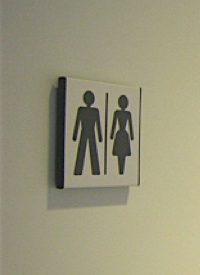
Maryland’s Baltimore County is considering an ordinance that critics warn would allow transvestites, cross-dressers, and men confused about their gender to access women’s bathrooms, showers, and dressing rooms. Tom Quirk, the county council member who is sponsoring what he calls the “Act Concerning Human Relations” (Human Relations Bill No. 3-12), insisted that the measure is designed to address discrimination by employers based on an individual’s sexual orientation and gender identity. “It’s my strong belief that the only thing that should matter is someone’s qualifications for a job,” Quirk told the Columbia Patch, a local newspaper.
But the measure also includes language that would allow men dressed as females to walk into women’s accommodations, and that is raising protests from some citizens and groups. Ruth Jacobs, president of Maryland Citizens for a Responsible Government, argued that the proposed legislation would do little more than facilitate peeping toms in their lecherous pastime. “The bill is a direct attack on women’s privacy,” said Jacobs, noting that under a similar measure, Portland, Oregon’s “gender identity” law, a cross-dressing sex offender gained access to a women’s locker room, where he was caught changing his clothes in the presence of little girls. “Women are easily victimized, and ladies’ bathrooms can be risky places when men have access,” Jacobs said. “Since the passing of a similar law in Montgomery County, Maryland, rapes have occurred in the women’s bathrooms of Montgomery Community College, Asbury nursing home, Pelican restaurant, and Bethesda Hyatt.”
The proposed gender measure in Baltimore County came to a head after Christopher (“Chrissy”) Lee Polis, a man dressed as a woman, was beaten up by two women as he attempted to enter a women’s restroom at a local McDonald’s restaurant. “A woman and teenage girl were both convicted of the assault, which was recorded on video and uploaded to YouTube,” reported the Columbia Patch.
Sharon Brackett of Gender Rights Maryland, a supporter of the bill, told the paper that “transgenders are the last social group that it’s OK to discriminate against. A law like this sets the tone that it’s not OK to discriminate.”
But Jacobs said that the law would merely encourage gender confusion. “Individuals with gender identity disorder can be so focused on their appearance that they are unable to work or maintain relationships,” she said. She recalled that PFC. Bradley Manning, the soldier charged with leaking classified documents to Wikileaks, had informed his superiors that gender identity disorder had affected his ability to do his job and interact with others.
“Individuals with mental illnesses are more likely to be both victims of crime and to victimize,” she said, adding that “treatment of mental illness, and not collaboration with mental illness,” is what is needed to decrease both problems.
While the bill would allow businesses in the county to work out their own rules to accommodate “transgender” customers and employees, critics noted that there does not appear to be an opt-out clause in the bill for those whose religious convictions are at odds with the “transgender” behavior.
Warned Jacobs: “Council members are not only endangering women and children” with the measure, “but prohibiting employers from using common sense in their hiring and firing practices by subjecting businesses, public accommodations, and churches to this far reaching gender expression law.”
According to the Columbia Patch, the issue of access by “transgender” individuals to opposite-sex bathrooms was used to derail a similar bill in Maryland’s state legislature last year.


